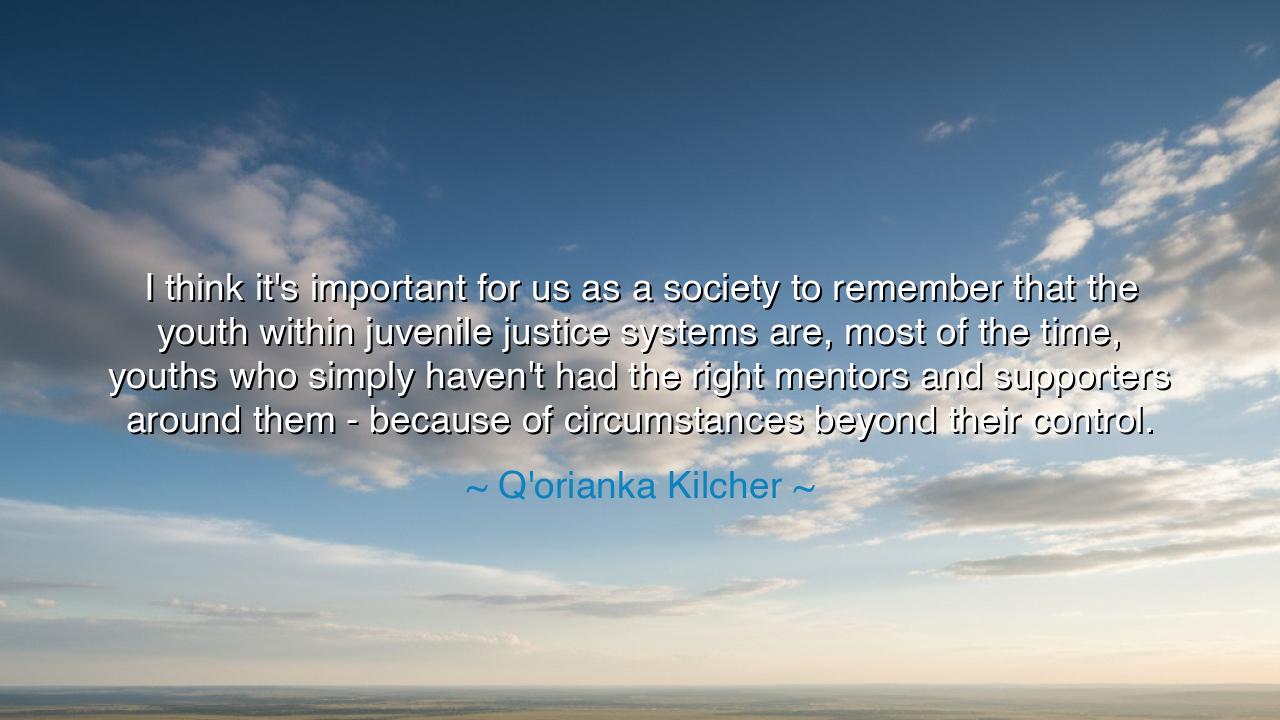
I think it's important for us as a society to remember that the
I think it's important for us as a society to remember that the youth within juvenile justice systems are, most of the time, youths who simply haven't had the right mentors and supporters around them - because of circumstances beyond their control.






Hear the tender yet powerful words of Q’orianka Kilcher: “I think it's important for us as a society to remember that the youth within juvenile justice systems are, most of the time, youths who simply haven't had the right mentors and supporters around them—because of circumstances beyond their control.” In this utterance lies a truth too often forgotten: the young who stumble are not always born of malice, but of neglect, abandonment, and the cruel winds of fate. Their mistakes are not only their own, but the reflection of a society that has failed to guide them, nurture them, and hold them close.
The ancients knew that children were like clay—soft, pliable, and ready to be shaped. In Athens, the philosopher Plato warned that the soul of the youth must be molded with wisdom, or else it would harden into corruption. In India, the sages taught that the destiny of a child is written not only by their own hand but by the hands of parents, teachers, and elders who guard their path. To neglect this duty is to abandon the young to chaos, and chaos births sorrow. Thus, Kilcher reminds us that circumstances beyond their control often thrust youth into darkness, and that true justice demands compassion as much as correction.
History gives us the story of Frederick Douglass, who as a boy was born into slavery, denied education, and surrounded by cruelty. By the world’s judgment, his path should have been one of bitterness and crime. Yet, when at last he found mentors—teachers who slipped him knowledge, friends who whispered encouragement—his life transformed. From chains he rose to become a great orator and champion of liberty. His story shows us that when supporters and mentors surround the vulnerable, they rise not only above their own hardship but become beacons of hope for all.
When society looks upon troubled youth and sees only criminals, it blinds itself to the deeper truth: no child is born desiring destruction. Hunger, poverty, broken homes, abuse, and neglect forge the chains that lead many to crime. To treat these youths as enemies rather than children in need is to harden injustice itself. Kilcher calls us to remember that justice without mercy is cruelty, and punishment without guidance is futility.
The lesson, then, is clear: if we would heal society, we must heal its children. This means creating homes of love, schools of encouragement, and communities of guidance. It means finding the lonely youth and giving them mentors who can see beyond their mistakes into their potential. It means replacing judgment with compassion, and discipline with direction. For every young person restored is not only a life saved, but a future brightened for generations to come.
Therefore, O listener, take this charge to heart: do not turn away from the youth who falters. Seek to understand their pain. Offer guidance where others offered neglect. Be the mentor, the supporter, the steady hand that circumstances denied them. For it is far easier to shape a child than to repair a broken adult, and far nobler to prevent despair than to punish it.
And so, let Kilcher’s words echo like a bell of warning and hope: “The youth within juvenile justice systems… simply haven't had the right mentors and supporters around them.” Let this truth stir us from complacency. Let us not condemn the lost, but guide them home. In doing so, we not only redeem the young—we redeem society itself, proving that compassion is the truest form of justice, and that the measure of a people lies in how they treat their most vulnerable.






AAdministratorAdministrator
Welcome, honored guests. Please leave a comment, we will respond soon